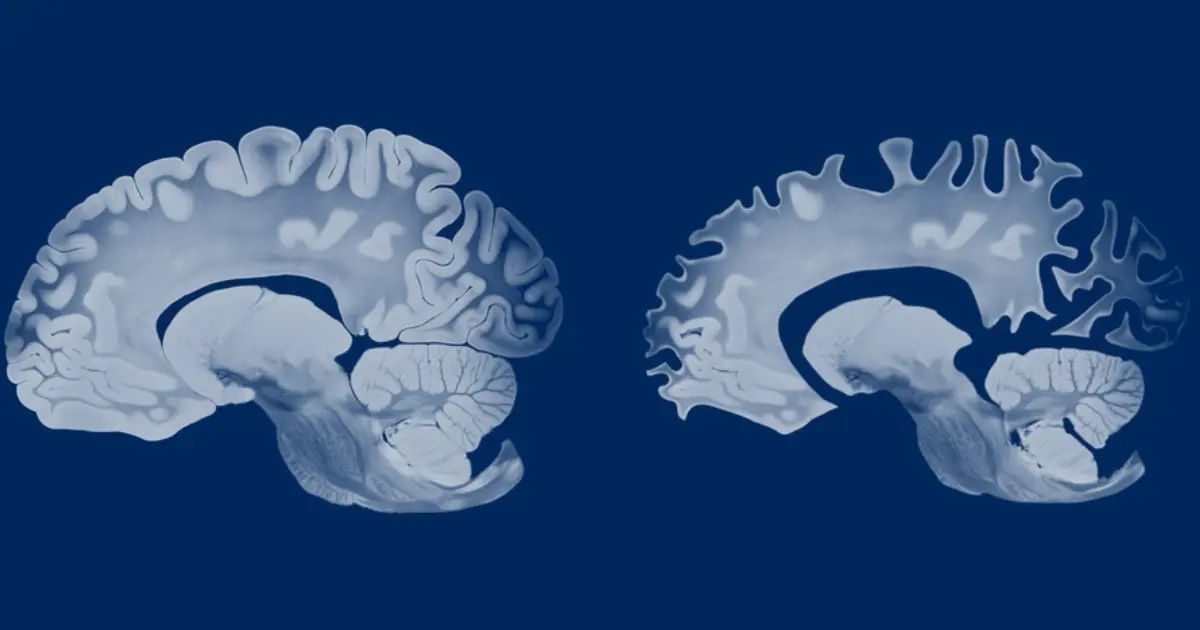Our bodies change as we age; the brain is no exception. Brain volume loss is one of the most concerning changes, a natural part of aging. However, research has revealed that this process isn’t uniform across genders or ages, and factors like cardiovascular health and obesity play critical roles in accelerating brain atrophy.
The Late 50s: A Pivotal Period for Men’s Brain Health
Recent findings suggest that men in their late 50s to early 60s may be particularly vulnerable to brain volume loss linked to cardiovascular risks and obesity. In contrast, women typically face similar risks about a decade later.

Key Findings from the Study:
- Age Range at Risk:
- Men: Ages 55-64.
- Women: Ages 65-74.
- Cardiovascular Risk Factors: Obesity, particularly abdominal and visceral fat, was strongly associated with brain atrophy.
- Affected Brain Regions: Temporal lobes, which are crucial for memory and cognition, showed significant changes in volume.
The study, which analyzed over 34,000 participants aged 45-82 years using MRI data, highlights the urgent need for early intervention to mitigate these risks, particularly in men.
Why Brain Volume Loss Matters
Brain volume loss is often linked to cognitive decline, including memory loss, reduced problem-solving skills, and an increased risk of neurodegenerative diseases like Alzheimer’s disease. The changes in brain volume, especially in the cortical grey matter and temporal lobes, can significantly impact daily functioning and quality of life.
Role of Cardiovascular Health in Brain Aging
The connection between cardiovascular health and brain volume is well-documented. High blood pressure, high cholesterol, and obesity can lead to:
- Reduced blood flow to the brain.
- Chronic inflammation, which damages brain cells.
- Accumulation of visceral fat, which has a more profound impact on brain health compared to subcutaneous fat.
The Gender Difference: Why Timing Matters
While both men and women are susceptible to these risks, the timeline differs:
- Men experience a significant impact on brain volume between ages 55 and 64.
- For women, the risk becomes prominent between 65 and 74.
This difference suggests the need for gender-specific health strategies. For men, addressing cardiovascular risks a decade earlier than women may reduce their risk of cognitive decline.
Steps to Protect Your Brain Health

Preventing brain volume loss isn’t just about genetics; lifestyle choices play a crucial role. Here’s how you can take action:
- Monitor Cardiovascular Health:
- Maintain healthy blood pressure and cholesterol levels.
- Manage blood sugar to reduce the risk of diabetes.
- Maintain a Healthy Weight:
- Focus on reducing visceral fat through a balanced diet and regular exercise.
- Incorporate heart-healthy foods, such as whole grains, fruits, vegetables, and lean proteins.
- Exercise Regularly:
- Engage in aerobic activities like walking, swimming, or cycling.
- Include strength training to improve overall metabolic health.
- Cognitive Engagement:
- Challenge your brain with puzzles, reading, or learning new skills.
- Stay socially active to support mental health.
- Early Intervention:
- Men should consider aggressive interventions in their late 40s or early 50s to address cardiovascular risks.
- Women should adopt similar measures by their late 50s or early 60s.
The Future of Brain Health: A Personalized Approach
The study also revealed that the presence of the apolipoprotein ε4 (APOE ε4) gene, a known risk factor for Alzheimer’s disease, did not significantly alter these findings. This suggests that lifestyle interventions can benefit both carriers and non-carriers of this gene.
Taking Charge of Your Brain Health
Brain volume loss is an inevitable part of aging, but its rate and severity can be influenced by lifestyle and medical interventions.
For men, addressing cardiovascular risks as early as their late 40s may significantly reduce the risk of cognitive decline. For women, similar strategies in their late 50s can be effective.
By prioritizing cardiovascular health, maintaining a healthy weight, and staying mentally active, we can take proactive steps to protect our brain health and enjoy a better quality of life as we age.
Take charge of your health today – small changes now can lead to a healthier brain tomorrow.
Protect Your Brain Health – Contact Neurodiagnostics Medical P.C.
At Neurodiagnostics Medical P.C. in New York City, we specialize in diagnosing and treating conditions that affect brain health, offering advanced neurological care tailored to your unique needs. If you’re concerned about brain volume loss, memory issues, or other neurological conditions, our expert team of neurologists is here to help.
Take a proactive step toward protecting your cognitive health—schedule an appointment today by calling us at (347) 602 – 9530. Don’t wait—your brain deserves the best care.
While we accept some insurance plans, coverage varies. To confirm your specific plan is accepted, please call our office or email us at info@neuroinjurycare.com to verify your coverage before scheduling your appointment.


